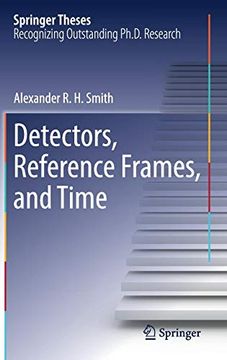Share
Detectors, Reference Frames, and Time (Springer Theses)
Alexander R. H. Smith (Author)
·
Springer
· Hardcover
Detectors, Reference Frames, and Time (Springer Theses) - Alexander R. H. Smith
Choose the list to add your product or create one New List
✓ Product added successfully to the Wishlist.
Go to My Wishlists
Origin: U.S.A.
(Import costs included in the price)
It will be shipped from our warehouse between
Thursday, June 13 and
Monday, July 01.
You will receive it anywhere in United Kingdom between 1 and 3 business days after shipment.
Synopsis "Detectors, Reference Frames, and Time (Springer Theses)"
This thesis uses the tools of quantum information science to uncover fascinating new insights about the intersection of quantum theory and relativity. It is divided into three self-contained parts, the first of which employs detector models to investigate how the information content of quantum fields depends on spacetime curvature and global spacetime topology. The behavior of Unruh-DeWitt detectors on curved spacetimes are investigated, following which these detectors are used to probe the vacuum state of a scalar field in various topologies. This leads to a generalization of the entanglement harvesting protocol involving detectors in arbitrary curved spacetimes admitting a Wightman function. The second part extends the theory of quantum reference frames to those associated with noncompact groups. Motivated by the pursuit of a relational relativistic quantum theory where the group of reference frames is the Poincaré group, the author then generalizes a communication protocol between two parties lacking a common reference frame to the scenario where the group of transformations of their reference frame is a one-dimensional noncompact Lie group. Finally, the third part, inspired by theories of quantum gravity, generalizes the conditional probability interpretation of time, a proposed mechanism for time to emerge from a fundamentally timeless Universe. While the conditional probability interpretation of time is based upon conditioning a solution to the Wheeler-DeWitt equation on a subsystem of the universe that acts a clock, the author extends this approach to include an interaction between the system being used as a clock and a system whose evolution the clock is tracking.
- 0% (0)
- 0% (0)
- 0% (0)
- 0% (0)
- 0% (0)
All books in our catalog are Original.
The book is written in English.
The binding of this edition is Hardcover.
✓ Producto agregado correctamente al carro, Ir a Pagar.

